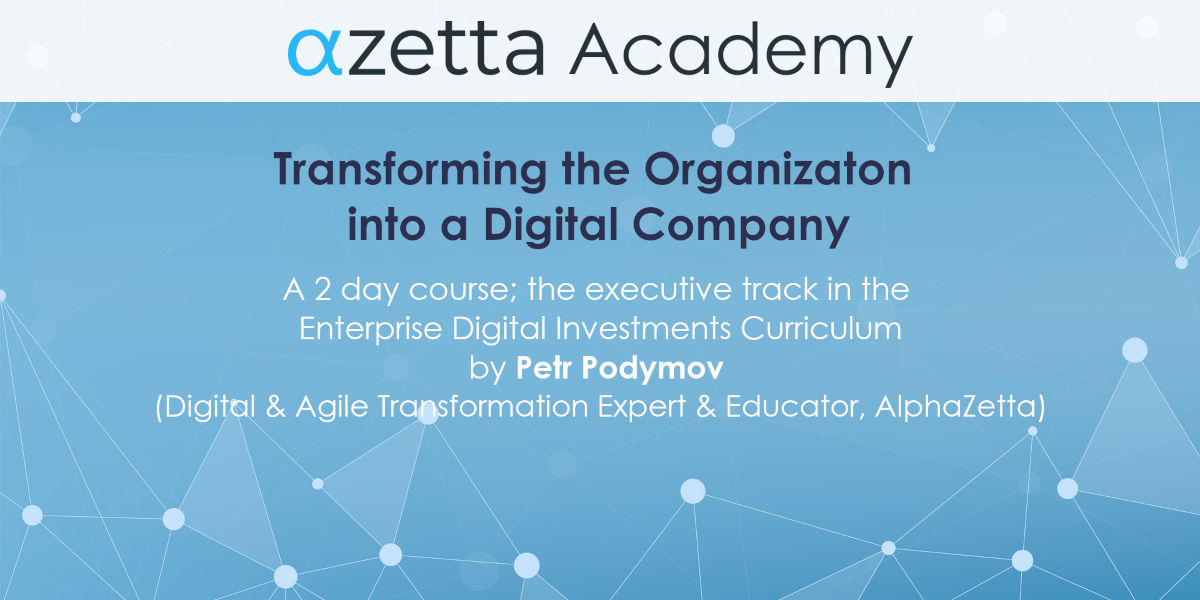This course provides an approach to transforming an organisation into a digital company. It offers an overview of how to evaluate a digital investment portfolio and then how to enable digital transformation via organisational change.
Global disruption means unpredictability and poses substantial challenges even for market leaders. Goals and stability are no longer easy to achieve. Indeed, modern organisations need to be dynamic enough to change direction with weeks in order to be successful.
Such enterprise agility needs to be built on a solid foundation of appropriate organisational structure and governance, as well as a strong technical platform.
The course covers how to:
- benchmark organisations against selected large companies who have already been through digital and agile transformation
- structure a digital transformation portfolio and assess its completeness
- improve corporate culture for investments and change execution
- transform an organisation to enable digital transformation
- establish agile governance in a volatile market while keeping new structure and strategy aligned
In assessing and preparing your organisation for digital transformation, you will bring your current or emerging business model for evaluation. You will be aiming to increase your market share in the context of low predictability, such as in 2020-21.
The course relies on open discussions of participants’s real world situations. Petr will apply his extensive successful experience to guide a review of each business scenario, working with you to develop a set of recommendations.
The course contains two major how-to blocks 1 day each:
1. How to evaluate enterprise Digital Portfolio
2. How to transform entire Organization
The course forms the executive track in the Enterprise Digital Investments Curriculum.
Day 1: Evaluating an Enterprise Digital Portfolio
Focus: to discuss core aspects of a successful digital portfolio.
- Valuate project portfolio (old school governance)
- Phase–gate approach
- Dimensions and roles in project evaluation
- Centralization / delegation examples
- Programs still valid for strategy execution
- Role and different types of enterprise PMO
- Practical “Go” / “No go” decisions
- Participant case-study: your role in a committee
- Architecture as a strategy (business layer)
- What is strategy (what it is not) – let’s talk about definition
- Path from online to real digital company
- Engineering approach: capability map, value stream, customer journey
- Long-term digital strategies for stable foundation (Enablers)
- Middle-term digital strategies for fast adaptation (Epics)
- Core dimensions of sample platform strategy
- Participant case-study: connecting strategies with CJ and VS
- Data as an energy (information layer)
- Path to data-driven company
- Data culture and data governance
- Core investments in a machine: digital twins and more
- Core investments into people: data literacy and more
- Facets of performance management
- Participant case-study: prioritize data-driven investments against strategies
- Technology investments (tech layer)
- Digital platform pillars: innovation, run and change
- Evolution of ITC organization: centralized vs. decentralized
- Technology adoption, benchmark (value and cost)
- Investing in information security (risk-based approach)
- IT Budgets and digital performance
- Participant case-study: TCO drivers and core risk dimensions
Day 2: Transforming the entire Organization
Focus: to learn from market leaders how to change investment model itself.
- Introducing agile transformation (to enable digital strategy)
- The idea of agile (why it does not work as promised)
- Idea and components of enterprise agility
- Evolution of enterprise investments (real market examples)
- Business and digital product management
- Participant case-study: is there perfect product strategy
- Making a change portfolio goal-driven
- Business goals and Investment strategies
- Agile organization vs. agile projects
- Value streams vs. business capability
- Investment in constant change
- Alignment based on objectives setting
- Participant case-study: transforming change portfolio
- Transforming organizational structure
- Tri-modal organization
- Business projects and digital products
- Digital resources (formerly ITC)
- Domain organization concept (strategic DDD)
- Business services and business processes
- Participant case-study: roles you need (or not) in the organization
- Corporate culture and people empowerment
- Corporate culture maturity assessment
- Investing in leadership
- Investing in mistakes
- Culture and performance (OKR example)
- Human centricity as a Strategic advantage
- Participant case-study: upgrade governance from approval to alignment
Each topic includes a call for real case and open discussion.
Additional Information – Transforming the Organization into a Digital Company
| Audience | Management, C-Suite
This course aimed at companies with significant investments in enterprise technology or that are making efforts to improve change management. It is for business and IT management involved in digital transformation; program leaders, senior managers & directors. |
| Prerequisites | Participants should have experience in project/product/team management and in working with enterprise technology within an organisation. It is recommended but optional to have also completed courses 1, 2 & 3 (5 days total) from the Enterprise Digital Investments Curriculum. |
| Objectives | - Learn how to benchmark market orienteers against selected large companies who have already been through digital and agile transformation
- Structure a digital transformation portfolio and assess its completeness
- Improve corporate culture for investments and change execution
- Know how to transform a given organisation to enable digital transformation
- Establish agile governance in a volatile market while keeping new structure and strategy aligned
|
| Format | Class |
| Duration | 2 days in-person, 4 part-days online |
| Course Author | Petr Podymov |
| Trainer | Courses are taught by Petr Podymov and/or his hand-picked team of highly skilled instructors. |
| Delivery Method | Online, in-person at AlphaZetta Academy locations or on-premise for corporate groups |
Our online courses run as live online meetings using Zoom for the video meeting part and Microsoft virtual computers for the practical components. The benefit of having a live trainer for online training is you can ask questions, obtain mentoring from the trainer and interact with classmates.
Course participants will require the following technologies and online accounts. Please check that your setup satisfies these requirements:
- Course participants will require the following technologies and online accounts:
- Reliable computer (Windows, Mac or Linux)
- Webcam (to help facilitate the mentoring aspect of our training)
- Reliable internet access
- A quiet space
- Zoom video conferencing software and Zoom account (register and pre-install the software at zoom.us)
- Microsoft account in order to access the virtual lab PCs (Existing or new account. There’s nothing to be installed, you just need an account to sign-in with.)
Meals and refreshments
Face-to-face courses: Catered morning tea and lunch are provided on both days of the course. Please notify us at least a week ahead if you have any special dietary requirements.
Feedback
Use academy@alphazetta.ai to email us any questions about the course, including requests for more detail, or for specific content you would like to see covered, or queries regarding prerequisites and suitability.
If you would like to attend but for any reason cannot, please also let us know.
Variation
Course material may vary from advertised due to demands and learning pace of attendees. Additional material may be presented, along with or in place of advertised.
Cancellations and refunds
You can get a full refund if you cancel 14 days or more before the course starts. No refunds will be issued for cancellations made less than 14 days before the course starts.
Frequently asked questions (FAQ)
Do I need to bring my own computer?
This is dependent on the venue. Please check the course event page.
Why do I need to provide a shipping address?
For online courses, we need an address to send you the course notes that you need for the course.
Discounts
Face to face public courses: early bird pricing is available until 2 weeks prior. Group discounts: 5% for 2–4 people, 10% for 5–6 people, 15% for 7–8 people, and 20% for 9 or more people. Discounts are calculated during checkout.
Online public courses: available at a 25% off the face-to-face courses as a special introductory price. to groups or to individuals who want to follow a curriculum program and attend multiple courses:
- 2-4 courses/attendees 10% off
- 5+ courses/attendees 20% off
Hurry as bookings will close 1 week before each course. Group discounts are calculated during checkout on individual courses. Individuals can book multiple courses at a discount – please enquire.
Course Booking Terms and Conditions
Private and Corporate Training
In addition to our public seminars, workshops and courses, AlphaZetta Academy can provide this training for your organisation in a private setting at your location or ours, or online. Please enquire to discuss your needs.

Based in Russia
Petr is a seasoned Enterprise Architect with a focus on planning, explaining and justifying structural investments in business and technology change and transformation programs. He has more than 15 years’ experience in banking, retail and education industries. Since 2011 he has focussed on digitally oriented organisational transformations, having worked his way through business process management to become a project portfolio leader, then a management consultant and CIO.
Petr has played an expert role in several huge-scale PMO establishment initiatives. Once demand for agile-transformation appeared, he participated in advanced governance model creation with enterprise agility pioneers of their industry: Sberbank of Russia and Leroy Merlin. Petr is also a university lecturer in magistracy and new course author since 2015 and develops education programs for professional audiences.



